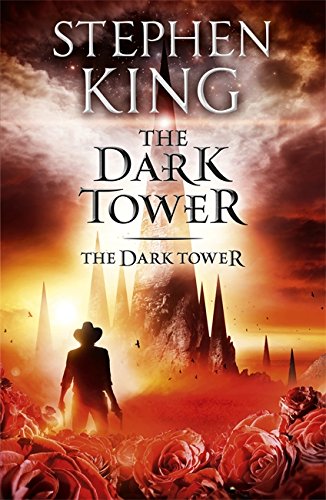
 The Dark Tower by Stephen King
The Dark Tower by Stephen King
Stephen King’s concluding volume of The Dark Tower series, The Dark Tower, is nothing if not surprising. Since its release, fans have squabbled over whether King hits a homerun or hits the ditch in the final volume of what has been described as his masterwork.
Without giving away the ending, I think the resolution of The Dark Tower is fantastic.
When The Dark Tower opens, Roland and his posse of gunslingers have divided their forces. Susannah/ Mia is about to give birth to a chap, an entity somehow fathered by both Roland and The Crimson King. Randall Flagg is lurking in the shadows and character/ author Stephen King is about to be run down by a van. Both a rose and the Dark Tower itself need to be saved, not to mention the universe. It’s a pretty exciting set up for a concluding novel — one that King wastes no time resolving.
 Instead, the majority of The Dark Tower surprisingly leaves most of these old concerns behind to focus on a new stage in Roland’s quest to reach the Dark Tower. After six books, Roland is at last about to reach the Dark Tower. Ruthless and relentless, Roland has vowed to reach the tower for the friends and lovers that he has lost, sacrificed, and murdered. Nothing will stop him: not vampires, not gigantic worms that chase him through mountain tunnels, and certainly not a humanoid spider. If any of his friends die, will Roland stop to mourn for them? Probably not.
Instead, the majority of The Dark Tower surprisingly leaves most of these old concerns behind to focus on a new stage in Roland’s quest to reach the Dark Tower. After six books, Roland is at last about to reach the Dark Tower. Ruthless and relentless, Roland has vowed to reach the tower for the friends and lovers that he has lost, sacrificed, and murdered. Nothing will stop him: not vampires, not gigantic worms that chase him through mountain tunnels, and certainly not a humanoid spider. If any of his friends die, will Roland stop to mourn for them? Probably not.
Like us, Roland is intent on reaching the Dark Tower.
However, what will it mean to finish this quest? What makes The Dark Tower novels impressive is the romance that King has lent to Roland’s quest. Only the broadest details of what the Dark Tower is have been given. Instead, King has built his Dark Tower almost entirely out of allusions and recollections. Readers, like Roland, simply trust that the destination will justify the journey.



Not necessarily for this series, but in general I’ve found many of King’s books to have a somewhat weak ending, but I think that is due to his stories being so intense that it’s like a sudden jolt; the momentum reaches such a break-neck speed, that the stop can’t help but be too jarring to accept.
To be honest, some of King’s endings remind me of Lassie. So many characters have this sudden and conveniently inexplicable sixth sense — the Lassie sense, if you will — that if they visit a well, the villain will implode. The Lassie sense is at work at the end of the Dark Tower, too, but the very end of the book is quite good.